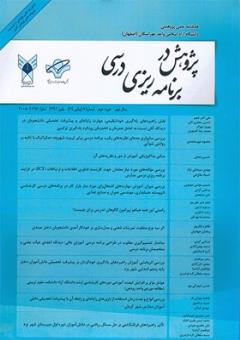Identifying obstacles preventing the implementation of Compatible curriculum in elementary school
Subject Areas : Research in Curriculum Planning
1 - Associate Professor in Educational Sciences Department, Literature & Human Sciences Faculty, University of Qom, Qom, Iran.
Keywords: Elementary School, Curriculum, Added Value of Schools, Curriculum Implementation, Compatible Curriculum.,
Abstract :
The research was conducted with the aim of identifying the obstacles preventing the implementation of Compatible curriculum in elementary school. The approach of qualitative research and its method was data foundation. The participants of the research were experts familiar with the topics of education and curriculum planning in elementary school of Isfahan city in 2022, and 18 people were selected by purposeful sampling and snowball method until theoretical saturation. The collection tool was a semi-structured interview. The data were analyzed in three stages of open, central and selective coding. Data analysis led to the extraction of 110 concept codes, statistics of 30 components and four dimensions, which were obtained in the form of a research model. The results showed can be divided into four individual dimensions (lack of motivation and distrust, insufficient salaries and rewards, weak individual knowledge and awareness), organizational (decreased participation in the formulation and preparation of programs, lack of meritocracy, hierarchy complex, long and ambiguous organization), managerial-structural (inappropriate and unfair delegation of authority, weak interactions of managers, managers' desire to maintain their power) and political-social (cynicism and negative attitude of people towards private education, incoherence and incoherence of government policies) categorized. The most important achievement of the research is that the obstacles introduced are basic, deep and wide, therefore, a sudden shift from a focused curriculum approach to a Compatible one will be dangerous and associated with failure.
Aghababaian, P.; Hatami, H. & Aghababaian, P. (2014). Reflection on the role of centralization and decentralization in the structure of education and its implications in the curriculum system of Iran, Tehran: International Conference on Economics, Management and Social Sciences. https://civilica.com/doc/388384 (Persian).
Amin Khandaghi, M & Dehghani, M. (2009). Reflection on centralism, centralism and returning to centralism and examining their implications for Iran's curriculum system: a new perspective, Educational and Psychology Quarterly, 11(2): 184 -165. https://ensani.ir/ file/download/article/20130914145039-9828-33.pdf (Persian).
Bagheri, Kh. (2011). Development in education and training in the light of agency and interaction, Monthly Basics of Education and Training, 7(4): 5-24. 10.22067/FE.V3I2.24768 (Persian).
Barrera, J., Bilbao, N., & Opadia, M. R (2022). Structural Equation Model of School-Based Management Practices and Teachers’ Commitment in Secondary Schools. Available at SSRN: https://ssrn.com/abstract=4147361
Bayati, A., Ghasemizad, A., & Taheri, A (2018). Investigating the Causes of hindering the Implementation of Decentralized Management in Educational Offices in Western Counties of Isfahan Province with the Approach of the Foundation Data Theory. Jundishapur Education Development Journal, 10 (Special Issue): 67-78. https://doi.org/10.22118/edc.2019.91022 (Persian).
Berman, P (1981), Educational change: An Implemention paradigm. In: Lehming R. Kane M. (eds) 1981 Improving Schools: Using What We Know. Sage. Beverly Hills, California. https://files.eric.ed.gov/fulltext/ED421767.pdf
Darling, H & Lieberman, A. (2012). Teacher education around the world: What can we learn from international practice. European Journal of Teacher Education DOI:10.1080/02619768. 2017.1315399
Eslamian, H. (2018). The study of the influence of two factors of concentration and recognition in the structure of the education system on religious education of students. two-quarter journal of educational sciences from the perspective of Islam, 6(10): 141-155. 10.30497/edus. 2018.69219 (Persian).
Farhadi Rad, H., Shahi, S., Tahmasabi, F. (2018). Examining the requirements of decentralization in education in Ahvaz city: vision, leadership and human resources, New Approach in Educational Management Quarterly, 10(2): 76-57. http://jedu. miau.ac.ir/ (Persian).
Fathi Vajargah, K. (2023). Principles and Basic Concepts of Curriculum Planning, Tehran: Elm Ostadan. (Persian).
Fullan, M. (1996). Curriculum Implementation. In: Ely, D.P. and Plump, T., Eds., International Encyclopedia of Educational Technology, Elsevier Oxford, Oxford. https://www.scirp.org/ reference/referencespapers?referenceid=1247904
Hannaway, J & Carnoy, M. (2016). Decentralization and School Improvement: Can We Fulfill the Promise? Jossey-Bass, San Francisco, CA https://www.amazon.com/Decentralization-School-Improvement-Fulfill-Education/dp/1555425054
Karakose, T., Yirci, R., & Papadakis, S (2021). Exploring the interrelationship between covid-19 phobia, work–family conflict, family–work conflict, and life satisfaction among school administrators for advancing sustainable management. Sustainability, 13(15), 8654. https://doi.org/10.3390/su13158654
Maleki, H & Aghamohamadi, J. (2014). Centralization and decentralization in the educational development planning process: challenges and obstacles, Work and Society Monthly, 180: 66-60. https://ensani.ir/file/ download/article/20160829125920-9625-388.pdf (Persian).
Mehrmohammadi, M. (1994). Reflection on the nature of decentralization in the curriculum planning system, Quarterly Journal of Curriculum Studies, 3(7): 11-19. https://ensani.ir/file/ download/article/20110218160355-253.pdf (Persian).
Piri, M., Attaran, M., Kiyamanesh, A., Hosseinnejad, GH. (2010). strategic school-based curriculum planning for decentralization of the curriculum planning system. Curriculum Research Journal, 1(1): 1-27. file:///C:/Users/Vivobook/ Downloads/4004413900101.pdf (Persian).
Saleh, F. (2016). An introduction to the development planning system in Iran's education, Research Journal of Strategic Research Institute, 17(2): 179-194. (Persian).
Sawada, A., Aida, T., Eiji Kozuka, G., Noguchi, H & Todo, Y. (2016). Election, Implementation, and Social Capital in SchoolBased Management: Evidence from a Randomized Field Experiment on the COGES Project in Burkina Faso. Working Papers 120, JICA Research Institute. https://ideas. repec.org/p/jic/wpaper/120.html
SharifiMoghadam, A. & Musapour, N. (2011). National and school-based curriculum planning, Kerman: Shahid Bahonar University. (Persian).
Shirali, E., Mehr Alizadeh, Y & Qashqaizadeh, N. (2023). Examining school-centered management using foundational data methodology, Educational Leadership and Management Quarterly, 17(1): 29-1. https:// magiran.com/ p2596629 (Persian).
Simon A. (2011). The Decentralization and Centralization of Curriculum in the Primary Education of Burkina Faso. 2011. Master Theses. https://core.ac.uk/download/pdf/48597773.pdf
Su, J. (2023). Exploring the Development of School-based Curriculum in Junior High Schools based on Chengdu's Indigenous Culture, Frontiers in Sustainable Development, 3(7):26-30. DOI:10. 54691/fsd.v3i7.5327
Teimourian, M & Soleimani, T. (2014). Decentralized school-based management concepts, theories, obstacles and benefits, 4th National Conference of Modern Management Sciences, Gorgan: Golestan Scientific and Professional Association of Managers and Accountants. https://civilica.com/doc/403906 (Persian).

